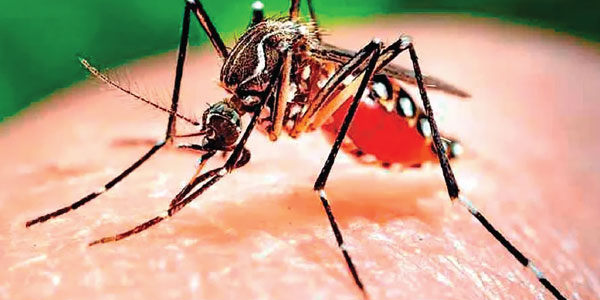
Unexpected ways to get biting insects to buzz off
Nothing ruins an outdoor adventure faster than ravenous mosquitoes.
The biting insects are a big downer in the summer months — and things could get worse. Mosquito populations are increasing and expanding their range, according to 2019 research published in the journal Nature Microbiology, leaving more people vulnerable to bites that cause red bumps and itchy skin. Mosquitoes can transmit serious diseases around the world, including West Nile virus, Zika and malaria.
Though malaria is not often found in the United States, the Centers for Disease Control and Prevention issued a health alert around mosquitoes and malaria. The CDC recently identified four cases of malaria in Florida and one in Texas in people who appear to have been exposed to the disease locally. Doctors and public health officials should be on the lookout for increased cases as people travel internationally over the summer and could bring cases back into the country, the CDC alert warned. Symptoms include fever, chills and headaches.
Here at home, getting the insects to buzz off can be a tall order, especially for those with higher levels of certain acids on their skin that make them more attractive to some mosquitoes.
In a 2022 study published in the journal Cell, researchers from the Rockefeller University in New York City found that people who produced higher levels of carboxylic acid were “mosquito magnets,” says scientist Maria Elena De Obaldia, who worked on the report. It’s unclear what causes people to have more (or less) of these acids on their skin.
“It’s possible that some people who are less attractive to mosquitoes than others express natural repellents,” De Obaldia says. “If this turned out to be true, we could use this information to try to design repellents that would make all of us smell more like the people who are less attractive to mosquitoes.”
Until then, we asked the experts to weigh in on what works — and what doesn’t — when it comes to mosquito prevention.
What works to repel mosquitoes
1. Bathing with coconut-scented soap
In contrast to fruity or floral-scented soaps that can lead to a mosquito-feeding frenzy, coconut repels the biting insects, researchers at Virginia Tech found.
“We like to scent our soaps with chemicals typically associated with the pleasant scent of flowers and plants, but mosquitoes also use plant-emitted [scents] to find plants and obtain sugars from their nectar,” says researcher Clément Vinauger, an assistant professor in the biochemistry department at Virginia Tech, who was among a group that studied this issue.
Vinauger notes that coconut-scented products might even be more effective than mosquito repellents containing the active ingredient known as DEET. The takeaway: Lather up with coconut-scented soap and slather on coconut-scented sunscreen before heading outside to discourage mosquitoes.
2. Wearing permethrin-treated clothing
Several brands and big box stores sell T-shirts, shorts, pants, socks, hats and other items that are treated with permethrin, a common synthetic insecticide designed to repel mosquitoes and other biting insects.
The U.S. Environmental Protection Agency first allowed clothing to be treated with permethrin in 1990, and studies show it works.
Permethrin-treated clothing was still effective after three months of wear, according to a study published in Parasites & Vectors, and a 2020 paper published in the Journal of Medical Entomology found that treated clothing is associated with 65 percent fewer tick bites. An earlier study from researchers in London found that wearing long-sleeved shirts and pants treated with the synthetic repellent reduced mosquito bites by 91 percent.
Katie Westby, a staff scientist in vector and disease ecology at Washington University in St. Louis, offers a word of caution.
“[Permethrin] should never be applied to skin; you treat your clothes with it,” she says. “It is harmful to pets, so it should be applied to clothing outdoors where animals will not come into contact with it.”
3. Switching up your wardrobe
Mosquitoes appear to use specific wavelengths on the visual spectrum to locate a target. Their preferred colors: red, orange, black and cyan (a greenish-blue), according to a study published by researchers at the University of Washington in the journal Nature Communications.
Opting for an outfit that is green, purple, blue or white — colors that mosquitoes avoid — could leave you with fewer bites during outdoor adventures.
Despite the potential for the color of your clothing to ward off mosquitoes, Westby says, “you would need to be completely covered for this to be an effective strategy to avoid bites.” But it can’t hurt to dress (not to) impress mosquitoes this summer.
4. Using insect repellent
Stick with the basics. Insect repellents that contain DEET are considered the “gold standard” when it comes to reducing bug bites and preventing mosquito-borne diseases.
The chemical signature in the insecticide interferes with the mosquito’s scent receptors, causing the insect to get confused and keep moving, and DEET-based products provide longer-lasting protection than insect repellents with other active ingredients.
Given the complex interaction of body odor, personal care products, diet and activity level that can make you more — or less — attractive to mosquitoes, Vinauger says, “I would still recommend using a conventional mosquito repellent.”
5. Lawn treatments
Pest companies offer treatments that blanket the lawn with insecticides to reduce mosquito populations. The treatments can work, though studies show that rainfall, the equipment used and application techniques can make them less effective — and the results might only be temporary.
“[Treatments] only kill mosquitoes that are in your yard at the time of spraying,” says Deborah Landau, director of ecological management for the Nature Conservancy. “Mosquitoes typically fly 1 to 3 miles, so they can quickly repopulate your yard.”
Lawn treatments can impact the ecosystem. Landau notes that the chemical sprays kill all insects, including bees, fireflies, butterfly larvae and other pollinators. “Birds often pick up insects killed by insecticides, and eat them or feed them to their young,” she adds.
When it comes to kids and pets, the research isn’t clear, according to Landau. It’s best to read manufacturers’ instructions, ask questions and proceed with caution.
3 things that don’t work
1. Citronella candles and plants
Citronella plants might look great in the garden, but they do little to deter biting bugs. Standing near the plants or having them in your garden doesn’t do much to keep mosquitoes at bay.
In fact, if you plant enough citronella, it could have the opposite effect.
“Finding natural alternatives to chemicals for repelling mosquitoes is an attractive option,” Westby says. “[But] there is evidence that having dense and flowering vegetation will attract mosquitoes to your yard as they like to rest in cool, humid habitat and take sugar meals from flowers.”
You can skip the citronella-scented candles, too. Despite their reputation, research published in the Journal of Insect Science found that citronella candles had “no effect” on reducing the number of mosquitoes.
2. Spreading coffee grounds
It’s common for coffee companies to offer used grounds to gardeners, and the nitrogen-rich remnants from a morning cup of coffee can improve soil structure, suppress common fungal diseases and provide nutrients for earthworms. But there is no solid research showing that it prevents mosquito bites.
Older research found that coffee-treated water (in birdbaths, for example) might deter mosquitoes from laying eggs in those spots. You should always empty standing water in your yard to prevent mosquitoes from laying eggs there.
3. Using spatial repellents
Old-school mosquito coils and battery-operated devices that release insect repellents into the air are often used in enclosed or semi-enclosed spaces such as restaurant patios or screened porches. Although store shelves are stocked with spatial repellents of all kinds, their effectiveness is mixed. The latest research shows that mosquitoes took fewer full blood meals. The insects bit and moved on before getting full, which led them to bite more frequently and to spend more time in areas with spatial repellents — and no one wants to spend their summer with more mosquito bites.
Bug zappers don’t work well on mosquitoes or other biting flies, according to University of Delaware researchers. But beneficial bugs, including pollinators, are often killed by bug zappers.
Editor’s note: This article was originally published on June 16, 2023. It has been updated to reflect new CDC information.
Cómo alejar a los mosquitos: qué dice la ciencia sobre la eficacia de distintos métodos
Nada arruina más rápido una aventura al aire libre que los voraces mosquitos.
Estos insectos son un factor muy desagradable en los meses de verano, y las cosas podrían empeorar. Según una investigación del 2019 publicada en la revista Nature Microbiology, la población de mosquitos está aumentando y su ámbito se está expandiendo, lo cual expone a más personas a esas picaduras que causan ronchas rojas y picazón en la piel. Los mosquitos pueden transmitir enfermedades graves en todo el mundo, entre ellas la infección por el virus del Nilo, el zika y la malaria.
Mientras tanto, consultamos a algunos expertos para conocer su opinión sobre qué da resultado —y qué no— en la lucha por mantener alejados a los mosquitos.
Estrategias eficaces para repeler mosquitos
- Bañarse con jabón con fragancia de coco
Al contrario de los jabones con fragancias frutales o florales, que pueden atraer muchos mosquitos hambrientos, el coco los aleja, según descubrieron investigadores de Virginia Tech.
Vinauger señala que los productos con olor a coco hasta podrían ser más eficaces que los repelentes de mosquitos que contienen el ingrediente activo llamado DEET. Conclusión: para desalentar a los mosquitos, báñate con jabón con fragancia de coco y usa protector solar con olor a coco antes de salir al aire libre. - Usar ropa tratada con permetrina
Ciertas marcas y varias tiendas grandes venden camisetas, pantalones cortos, medias, sombreros y otros artículos que han sido tratados con permetrina, un insecticida sintético común diseñado para alejar a los mosquitos y otros insectos que pican.
La Agencia de Protección Ambiental de EE.UU. (EPA) autorizó por primera vez el tratamiento de artículos de vestir con permetrina en 1990, y los estudios demuestran que es eficaz.
Katie Westby, científica de planta en Ecología de Vectores y Enfermedades en la Universidad de Washington en St. Louis, hace una advertencia.
“[La permetrina] no debe aplicarse nunca sobre la piel; se usa solo para tratar la ropa”, dice. “Es perjudicial para las mascotas, por lo que se debe aplicar a la ropa al aire libre, donde los animales no entren en contacto con ella”. - Cambiar la vestimenta
Los mosquitos parecen usar longitudes específicas de onda en el espectro visual para identificar un objetivo. Sus colores preferidos son el rojo, el naranja, el negro y el cian (un azul verdoso), según un estudio publicado por investigadores de la Universidad de Washington en la revista Nature Communications.
Si eliges ropa de color verde, morado, azul o blanco —colores que los mosquitos evitan—, es posible que no te piquen tanto durante una aventura al aire libre.
A pesar de la potencial defensa que el color de tu ropa pueda ofrecer contra los mosquitos, Westby dice que “tendrías que estar completamente cubierto para que esto sea una estrategia eficaz para evitar las picaduras”. Pero no pierdes nada con vestirte de modo de no llamar la atención de los mosquitos este verano. - Usar repelente de insectos
Mantente con lo básico y conocido. Los repelentes de insectos que contienen DEET se consideran el estándar de referencia cuando se trata de reducir las picaduras de insectos y evitar las enfermedades que transmiten los mosquitos.
La sustancia química distintiva en el insecticida interfiere con los receptores de aromas de los mosquitos y hace que se confundan y sigan en movimiento. Además, los productos con DEET proveen protección durante más tiempo que los repelentes de insectos con otros ingredientes activos.
Dada la compleja interacción del olor corporal, los productos de cuidado personal, la dieta y el nivel de actividad que pueden hacerte más —o menos— atractivo para los mosquitos, Vinauger dice que él “igualmente recomendaría usar un repelente de mosquitos tradicional”. - Tratar el césped
Las empresas de control de plagas ofrecen tratamientos que cubren el césped con insecticidas para reducir la población de mosquitos. Los tratamientos pueden dar resultado, si bien hay estudios que demuestran que la lluvia, el equipo utilizado y las técnicas de aplicación pueden hacerlos menos eficaces, y los resultados son solo temporales.
“[Los tratamientos] solo matan los mosquitos que están en tu jardín en el momento en que se aplican”, dice Deborah Landau, directora de Gestión Ecológica para la organización Nature Conservancy. “Los mosquitos normalmente vuelan entre 1 y 3 millas, por lo que pueden volver a instalarse en tu jardín rápidamente”.
En cuanto a los niños y las mascotas, las investigaciones no son totalmente claras, según Landau. Lo mejor es leer las instrucciones del fabricante, hacer preguntas y proceder con cautela.
3 cosas que no dan resultado
- Plantas y velas de citronela
Las plantas de citronela se ven muy bien en el jardín, pero no hacen mucho para alejar a los insectos que pican. Pararte cerca de las plantas o tenerlas en el jardín no ayuda en nada a mantener los mosquitos a distancia.
De hecho, si plantas mucha citronela, podrías ver el efecto opuesto.
“Identificar alternativas naturales en vez de usar productos químicos para repeler a los mosquitos es una opción atractiva”, dice Westby. “[Pero] hay pruebas de que tener una vegetación densa y floreciente atrae a los mosquitos al jardín, porque les gusta descansar en un ambiente húmedo y fresco y comer el azúcar de las flores”.
Olvídate también de las velas con fragancia de citronela. A pesar de su reputación, una investigación publicada (en inglés) en la revista Journal of Insect Science halló que las velas de citronela no tuvieron “ningún efecto” sobre la cantidad de mosquitos. - Esparcir granos de café
Es común que las compañías de café ofrezcan granos usados a los jardineros, y los restos del café de la mañana, ricos en nitrógeno, pueden mejorar la estructura del suelo, suprimir enfermedades micóticas comunes y aportar nutrientes para los gusanos. Pero no hay investigaciones sólidas que demuestren que evitan las picaduras de mosquitos.
Investigaciones anteriores hallaron que el agua tratada con café (en pilas para pájaros, por ejemplo) podría evitar que los mosquitos pongan huevos en ese lugar. Siempre debes vaciar toda agua estancada que pueda haber en tu jardín para evitar que los mosquitos pongan huevos allí. - Usar repelentes espaciales
Las tradicionales espirales para mosquitos y los dispositivos a batería que liberan repelentes de insectos en el aire se utilizan a menudo en espacios cerrados o semicerrados, como el patio de un restaurante o un porche con tela metálica. Si bien los estantes de las tiendas están repletos de repelentes espaciales de todo tipo, su eficacia es diversa. Las investigaciones más recientes indican que los mosquitos tuvieron menos alimentaciones completas de sangre: los insectos picaron y siguieron su camino antes de saciarse, lo que hizo que picaran con más frecuencia y estuvieran más tiempo en las áreas donde había repelentes espaciales. Y nadie quiere pasar el verano con más picaduras de mosquitos.
Los dispositivos electrónicos diseñados para atraer y matar insectos no son eficaces para controlar mosquitos u otras moscas que pican, según investigadores de la Universidad de Delaware. Pero, con frecuencia, esos dispositivos matan a insectos beneficiosos, incluidos insectos polinizadores.









